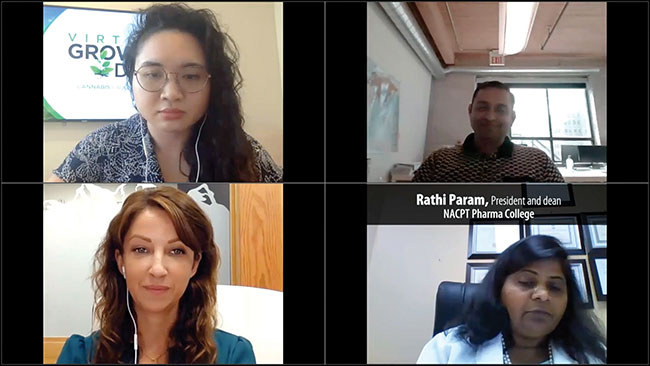
Features
Production
Cultivation
Spotlight: Virtual Grower Day 2020
Due to the pandemic, this year's Grower Day event turned virtual
December 28, 2020 By Jean Ko Din
 Clockwise: Jean Ko Din, Deepak Anand, Rathi Param, Alison McMahon
Clockwise: Jean Ko Din, Deepak Anand, Rathi Param, Alison McMahon Growing talent
Canada’s growers might be the industry’s greatest export.
According to a group of expert panelists at Grow Opportunity’s Virtual Grower Day event held Aug. 19, Canadian growers are in high demand overseas. Despite the challenges of current travel bans and mass layoffs in the Canadian cannabis industry, the panelists believe there is opportunity to be found.
In a panel titled, “Growing talent: Training the next generation of professional growers,” associate editor Jean Ko Din sat down with Deepak Anand, director and CEO of Materia; Alison McMahon, founder and CEO of Cannabis At Work; and Rathi Param, president and dean of NACPT Pharma College. Together, the four discussed what it takes to train, hire and retain a grower workforce that will elevate their organizations and the industry as a whole.
“I feel like one of the things that Canada has done really well and we’re not talking about this enough, is we have developed a very strong pool of talent,” said Anand. In his experience operating a European cannabis company, Anand finds there is a large shortage of skilled growers that could meet the demand in the global cannabis industry.
“We can’t find knowledgeable people that understand regulations… So I feel like Canada has this massive opportunity to export knowledge and talent from here.”
At her company, Cannabis At Work, McMahon spends a lot of time recruiting, training and headhunting for cannabis producers domestically and internationally. When she first started in the industry in 2014, skilled growers were in very high demand. As the market began to correct itself however, the grower workforce became a casualty to significant layoffs.
“Starting August to September of last year is when we saw a lot of that activity starting and my team crunched the numbers back in May and at that time, 30 per cent of the industry had been laid off and not all those are production or growing roles. There’s a lot of marketing and other ancillary kind of roles that were caught up in those layoffs,” she said.
For students learning the trade at NACPT Pharma College, Param said there is great concern for their job prospects. However, she was also encouraged by the entrepreneurial spirit in many.
“We understand the situation to be temporary and will improve with time,” said Param. “The current scenarios have encouraged some of our students to start their own business in the cannabis space which is a positive outcome of this pandemic.”
Panelists agreed now is the time to diversify skills and learn new areas of specialization.
‘Your grower is your lifeline’
Growers are not often given the spotlight in the cannabis industry. They often work behind the scenes, producing the best quality product possible.
Grower Day is one of a few events that celebrate the craft and science behind one of the country’s most exciting industries.
“Your grower is your lifeline and he’s the quarterback in your team,” said David Kjolberg, a veteran master grower. “And if you’re in the cannabis production space, the plant is everything.”
Kjolberg was one of four panelists that sat down with editor, Mari-Len De Guzman, in the segment, “The Grow Room: A discussion about growers by growers.” Other panelists included Gregg Wigeland, master cultivator at Sundial Cannabis; Max White, co-owner and operations manager of Aroma Cannabis; and Laine Keyes, director of cultivation and co-founder of Habitat Life.
Panelists discussed the importance of bringing master growers into the board room and in the short few years, Kjolberg has seen that the industry is increasingly prioritizing cultivation.
“When I first started in regulated cannabis production going back to 2014, there was a VP for everything… Now, the cannabis production facilities are getting less top-heavy. So your grower should definitely be an integral part of your executive team,” he said.
Not only does a good grower participate in making business decisions for the company, but panelists agreed that they must also surround themselves with experts in lighting, HVAC, environmental controls, etc. For White, integrated pest management (IPM) is his biggest undertaking at Aroma Cannabis as it can be a nightmare if one is not prepared for it.
“We’ve spent about four times more on our IPM program than in our nutrients,” he said. “I try to keep my finger on the pulse of what’s happening in IPM, and lighting and nutrients and everything, but IPM has definitely been the biggest learning curve and probably the biggest focus as we scaled up.”
Wigeland said using technology to maintain as many environmental controls as possible has been a game changer at Sundial. Each grow room has a specific set of needs and to be able to manage those controls in a central computer hub has helped them balance production of high quality products and meet targets to get to market as quickly as possible.
For Keyes, Habitat Life’s production system allowed the company to venture into new markets at the same time. Habitat Life uses aquaponics to produce Atlantic salmon and craft cannabis.
“We’ve really had to focus on our mineralization and digestor process to really make sure that both the salmon and the cannabis are getting the required nutrients because neither of them are the easiest things to grow,” he said. “With the technology emerging in the industry, It really gave us the ability to start getting the right people on the team to help us take aquaponics to the next level.”
Print this page

